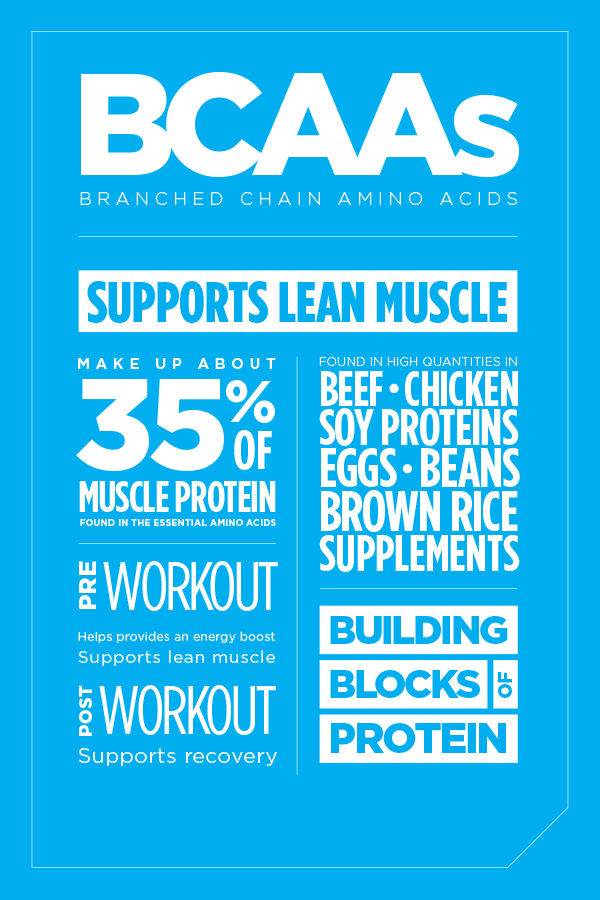If you are trying to stay on track with your weight-management goals during the holiday season and need a little help, proper supplementation may be the key to giving you an advantage. There are a few aspects of a healthy lifestyle to keep in mind – proper hydration, a healthy diet, exercise, and managing sleep and stress levels, but often overlooked is proper supplementation that meets your needs and goals.
It is mostly accepted that taking a multivitamin in concert with eating a healthy diet is a good way to fill in nutritional gaps, and many may be familiar with thermogenics – supplements and foods that help stimulate our metabolism to help the body use energy more efficiently. However, when we say the words branched chain amino acids, some run for the hills and others stop and look with a blank stare of amazement. Complementing your diet with the right supplements to meet your needs can help you achieve your healthy lifestyle goals.
What are BCAAs?
The tiny building blocks of protein, amino acids, have specific roles in not only building muscle but also helping with your weight-management journey when combined with diet and exercise. Amino acids serve several functions such as acting as enzymes, hormones, neurotransmitters, as well as building blocks of protein. There are two main types of amino acids, non-essential and essential amino acids. Non-essential amino acids are important but do not have to be obtained from your daily diet. Non-essential amino acids can be synthesized or made by the body. On the contrary, essential amino acids cannot be made by the human body, which means they must be obtained from the food you eat daily. There are nine essential amino acids – three of which are branched chain amino acids. Within each type of amino acid, there are several classifications based on structure and/or function. Branched chain amino acids, or BCAAs, were given their name because their structure resembles branches of a tree.
BCAAs – valine, isoleucine and leucine – play a vital role in providing energy to muscle tissue. One of the key components of weight loss, in conjunction with exercise, is changing body composition. Your body may lose not only fat mass but potentially muscle mass, too, if your diet and supplementation regimen do not support lean muscle mass. The maintenance and increase of muscle tissue help maximize your calorie-burning potential. By eating a diet with sufficient protein and proper supplementation to meet your needs and goals, you can help prevent fatigue during workouts by providing proper nutrition to your muscles.

How BCAA Supplements Fit into Weight Loss
The secret to managing weight is to monitor the amount and type of calories consumed versus the calories used. When you consume more calories than your body can use, your body eventually stores the excess energy as glycogen and long-term as fat, which usually results in weight gain. The reverse is also true in most cases. If you consume less calories, the body breaks down stored energy like glycogen (a complex type of sugar) and fat and uses them as fuel. It is important not to reduce your calorie intake below the recommended amount per day as suggested by the Food and Drug Administration, which is approximately 1,500 and 2,000 calories for women and men, respectively. When you reduce calorie intake it is important to be intentional about what type of calories you are consuming. The general recommendation is to eat around 0.36 grams of protein per pound of body weight. So for a 150-pound person that would be approximately 54 grams of protein. The Food and Drug Administration sets protein intake at 50 grams per day on a 2000 calorie diet. If you do not get enough protein, your body may begin to break down your muscle tissue to acquire what it needs. Supplementing with BCAAs helps to slow the breakdown of muscles due to reduced calorie intake in conjunction with exercise. There are several options for BCAA supplements that are commercially available. Look for one that meets your specific needs and goals. Remember, that a good BCAA supplement should have at least the amino acids: valine, leucine and isoleucine together. Valine helps support muscle metabolism, leucine maintains muscle mass and promotes recovery after workouts, and isoleucine increases endurance and energy as well as helps to facilitate the repair of muscle tissue.
If you choose to incorporate a BCAA supplement, keep in mind that they are best taken on an empty stomach or in between meals. This helps ensure there is no competition for absorption by other nutrients obtained through your diet. BCAAs can be taken before, during and after workouts to help with building of lean muscle mass, energy for muscle and to help with recovery. As always, consult your primary care provider when changing your diet and/or supplementation regimen to ensure that you are doing what is best for you and your body. Do you think adding extra BCAAs may be helpful to your healthy lifestyle routine? If so, how do you plan to incorporate them into your daily life?
 Dr. Lauren Horton is a senior manager in Research and Development at AdvoCare. She has used her expertise to successfully develop protocols, clinical designs and test strategies to help AdvoCare achieve research and product development goals. Before joining AdvoCare International, she was a clinical researcher at a leading clinical research organization. Dr. Horton loves to help improve the quality of life of those around her. She has helped men and women from all over the country discover how small steps each day can lead to huge strides towards living a healthier lifestyle. Dr. Horton holds a BS in biology from Rust College and a PhD in biomedical science from Morehouse School of Medicine and completed her post-doctoral studies at the University of Pennsylvania.
Dr. Lauren Horton is a senior manager in Research and Development at AdvoCare. She has used her expertise to successfully develop protocols, clinical designs and test strategies to help AdvoCare achieve research and product development goals. Before joining AdvoCare International, she was a clinical researcher at a leading clinical research organization. Dr. Horton loves to help improve the quality of life of those around her. She has helped men and women from all over the country discover how small steps each day can lead to huge strides towards living a healthier lifestyle. Dr. Horton holds a BS in biology from Rust College and a PhD in biomedical science from Morehouse School of Medicine and completed her post-doctoral studies at the University of Pennsylvania.





